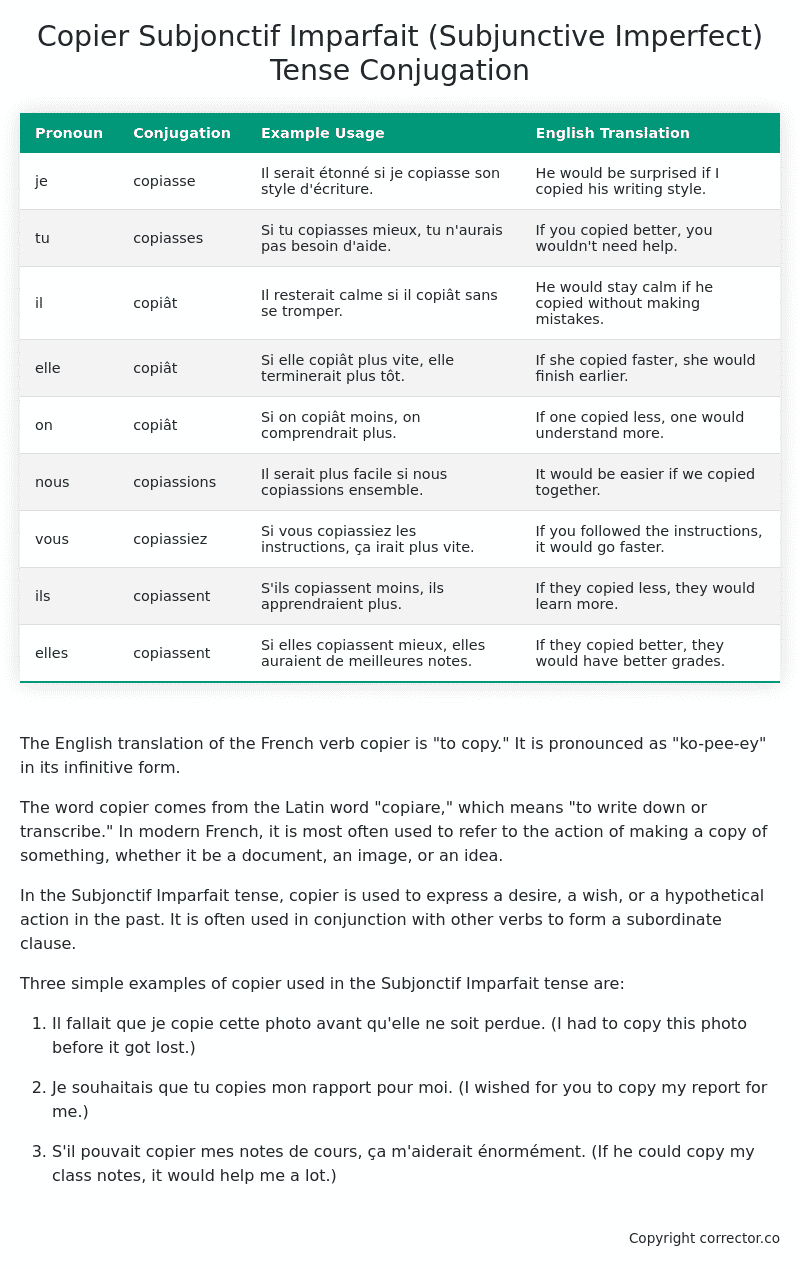Subjonctif Imparfait (Subjunctive Imperfect) Tense Conjugation of the French Verb copier
Introduction to the verb copier
The English translation of the French verb copier is “to copy.” It is pronounced as “ko-pee-ey” in its infinitive form.
The word copier comes from the Latin word “copiare,” which means “to write down or transcribe.” In modern French, it is most often used to refer to the action of making a copy of something, whether it be a document, an image, or an idea.
In the Subjonctif Imparfait tense, copier is used to express a desire, a wish, or a hypothetical action in the past. It is often used in conjunction with other verbs to form a subordinate clause.
Three simple examples of copier used in the Subjonctif Imparfait tense are:
-
Il fallait que je copie cette photo avant qu’elle ne soit perdue. (I had to copy this photo before it got lost.)
-
Je souhaitais que tu copies mon rapport pour moi. (I wished for you to copy my report for me.)
-
S’il pouvait copier mes notes de cours, ça m’aiderait énormément. (If he could copy my class notes, it would help me a lot.)
Table of the Subjonctif Imparfait (Subjunctive Imperfect) Tense Conjugation of copier
| Pronoun | Conjugation | Example Usage | English Translation |
|---|---|---|---|
| je | copiasse | Il serait étonné si je copiasse son style d’écriture. | He would be surprised if I copied his writing style. |
| tu | copiasses | Si tu copiasses mieux, tu n’aurais pas besoin d’aide. | If you copied better, you wouldn’t need help. |
| il | copiât | Il resterait calme si il copiât sans se tromper. | He would stay calm if he copied without making mistakes. |
| elle | copiât | Si elle copiât plus vite, elle terminerait plus tôt. | If she copied faster, she would finish earlier. |
| on | copiât | Si on copiât moins, on comprendrait plus. | If one copied less, one would understand more. |
| nous | copiassions | Il serait plus facile si nous copiassions ensemble. | It would be easier if we copied together. |
| vous | copiassiez | Si vous copiassiez les instructions, ça irait plus vite. | If you followed the instructions, it would go faster. |
| ils | copiassent | S’ils copiassent moins, ils apprendraient plus. | If they copied less, they would learn more. |
| elles | copiassent | Si elles copiassent mieux, elles auraient de meilleures notes. | If they copied better, they would have better grades. |
Other Conjugations for Copier.
Le Present (Present Tense) Conjugation of the French Verb copier
Imparfait (Imperfect) Tense Conjugation of the French Verb copier
Passé Simple (Simple Past) Tense Conjugation of the French Verb copier
Passé Composé (Present Perfect) Tense Conjugation of the French Verb copier
Futur Simple (Simple Future) Tense Conjugation of the French Verb copier
Futur Proche (Near Future) Tense Conjugation of the French Verb copier
Plus-que-parfait (Pluperfect) Tense Conjugation of the French Verb copier
Passé Antérieur (Past Anterior) Tense Conjugation of the French Verb copier
Futur Antérieur (Future Anterior) Tense Conjugation of the French Verb copier
Subjonctif Présent (Subjunctive Present) Tense Conjugation of the French Verb copier
Subjonctif Passé (Subjunctive Past) Tense Conjugation of the French Verb copier
Subjonctif Imparfait (Subjunctive Imperfect) Tense Conjugation of the French Verb copier (this article)
Subjonctif Plus-que-parfait (Subjunctive Pluperfect) Tense Conjugation of the French Verb copier
Conditionnel Présent (Conditional Present) Tense Conjugation of the French Verb copier
Conditionnel Passé (Conditional Past) Tense Conjugation of the French Verb copier
L’impératif Présent (Imperative Present) Tense Conjugation of the French Verb copier
L’infinitif Présent (Infinitive Present) Tense Conjugation of the French Verb copier
Struggling with French verbs or the language in general? Why not use our free French Grammar Checker – no registration required!
Get a FREE Download Study Sheet of this Conjugation 🔥
Simply right click the image below, click “save image” and get your free reference for the copier Subjonctif Imparfait tense conjugation!

Copier – About the French Subjonctif Imparfait (Subjunctive Imperfect) Tense
Formation
Common Everyday Usage Patterns
Interactions with Other Tenses
Subjonctif Présent
Indicatif Passé Composé
Conditional
Conditional Perfect
Summary
I hope you enjoyed this article on the verb copier. Still in a learning mood? Check out another TOTALLY random French verb conjugation!


